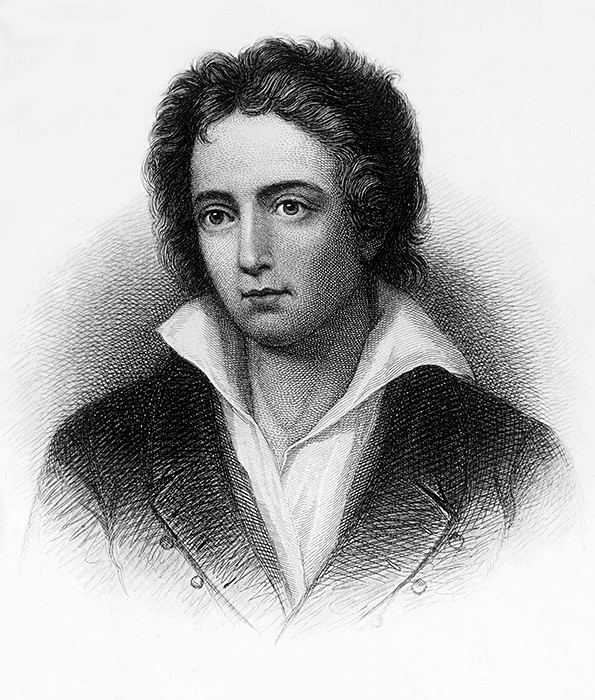Shelley, Percy Bysshe, << bihsh >> (1792-1822), was one of the great English lyric poets. He experimented with many literary styles and had a lasting influence on many later writers, particularly Robert Browning, Algernon Charles Swinburne, William Butler Yeats, George Bernard Shaw, and Thomas Hardy.
His life.
Shelley was born on Aug. 4, 1792, in Sussex into a wealthy and politically prominent family. He had a stormy career at Eton College and Oxford University, from which he was expelled in 1811 for writing a pamphlet called The Necessity of Atheism. 
In August 1811, Shelley eloped with 16-year-old Harriet Westbrook, the daughter of a former London coffee house owner. He abandoned her in 1814 and ran away with Mary Wollstonecraft Godwin. Mary was the daughter of William Godwin, a political philosopher whose liberal ideas greatly influenced Shelley. Although both said they did not believe in marriage, Shelley and Mary Godwin were married in 1816, after Harriet drowned herself. They had three children, two of whom died in infancy. See Shelley, Mary Wollstonecraft.
Shelley believed the Irish were being oppressed by their English rulers. He tried to rouse the Irish to rebel against England in his pamphlet An Address to the Irish People (1812). He wrote Queen Mab (1813), a revolutionary poem which attacked both political tyranny and orthodox Christianity. In 1816, Shelley and his wife became close friends with the poet Lord Byron in Geneva, Switzerland. That friendship led to an ongoing exchange of ideas that Shelley commemorated in Julian and Maddalo (1824), a poem in the form of a conversation.
After March 1818, Shelley went into exile in Italy. There he wrote a series of important works, including the play The Cenci (1820) and the poems Prometheus Unbound (1820), The Witch of Atlas (1820), Epipsychidion (1821), and Hellas (1822). The death of an acquaintance, the English poet John Keats, inspired his elegy Adonais (1821). On July 8, 1822, Shelley drowned while sailing near Livorno (sometimes called Leghorn), Italy.
His writings.
Shelley’s poems are emotionally direct, but difficult to understand intellectually. Much of his poetry is openly autobiographical, including his most famous lyric “Ode to the West Wind” (1819). Shelley’s spiritual attitudes were intensely personal and tended to oppose traditional Christian views. Shelley felt that spiritual truth was not based on either supernatural revelation or natural experience. Instead, he thought truth could be understood by the imagination alone. Shelley debated the role of the imagination as a spiritual guide in “Mont Blanc” (1816). This powerful meditative poem first revealed Shelley’s mature style. Another early lyric, “Hymn to Intellectual Beauty” (1816), tells of Shelley’s decision to devote his life to the pursuit of ideals. He also developed this theme in his poem Alastor (1816).
In his most ambitious long poem, the lyrical drama Prometheus Unbound, Shelley attempted to combine his imaginative faith with his hopes for humanity’s redemption here on earth. Like much of Shelley’s work, this play is based on classical Greek models. Prometheus, the creative power in humanity, is liberated by Demogorgon, a mythical figure who stands for inevitable change in human events. Prometheus forgives his tormentor, Jupiter, symbolizing the poem’s insistence on the power of mercy, forgiveness, and selfless love. At the end of the play, tyrannical earthly rulers and corrupt governmental institutions are defeated and love and beauty reign, though perhaps not forever. Shelley examined the practical moral implications of these ideas in his realistic Elizabethan-style tragedy, The Cenci.
Shelley’s later poetry became more somber and skeptical. The Irish poet William Butler Yeats described Shelley’s theme as an increasing conflict between infinite desire and the inability fully to realize such desire. The autobiographical Epipsychidion records Shelley’s vision of ideal love finding its lasting home in an earthly paradise. The poem describes his supposed success in achieving that vision through his love for an Italian noblewoman, Emilia Viviani. In the end, however, the poem casts doubt on that success and, even more, on the ability of mere words to describe such perfection.
In 1821, Shelley wrote his famous essay A Defence of Poetry. The work is valuable for its insights into poetry and Shelley’s attempt to use his views on imagination to define the role of poets. He asserts that poets sow the seeds of future reforms but do not themselves live to witness their realization.
Whether Shelley had begun to find some definite faith, philosophical or otherwise, we do not know, but his final poems are as grim and sorrowful as any he wrote. The last love lyrics that Shelley wrote are serene only in their hopelessness. According to his powerful unfinished poem on human defeat, The Triumph of Life, good and the means of accomplishing good cannot be reconciled. However grim his final vision, Shelley held on to the hope of inspiring future generations, as in the “Ode to the West Wind”:
Loading the player...Scatter, as from an unextinguished hearth Ashes and sparks, my words among mankind! Be through my lips to unawakened earth The trumpet of a prophecy! …
Ode to the West Wind by Percy Bysshe Shelley
See also “Ode to the West Wind.
